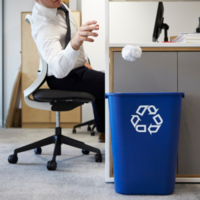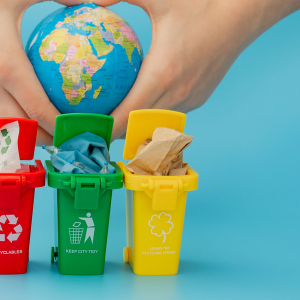Waste Not: The Ultimate Guide to Workplace Recycling Bins
Recycling is more than just a trend—it's a critical practice for businesses committed to sustainability. Choosing the right recycling bin for your workplace is essential for creating an effective recycling program. Not only does it help manage waste more efficiently, but it also promotes environmental responsibility among employees.
Understanding Your Recycling Needs
Before selecting recycling bins, it's important to understand the types of waste your workplace generates. This could include paper, plastic, metal, glass, organic waste, and even electronic waste (e-waste). By identifying your specific waste streams, you can choose bins that cater to each type of material.
Different Types of Recycling Bins
To effectively sort and manage waste, workplaces should consider different bins for different materials:
- General Waste Bins: For non-recyclable waste.
- Paper Recycling Bins: Specifically for paper products like office documents and newspapers.
- Plastic Recycling Bins: For plastic bottles, containers, and packaging.
- Metal Recycling Bins: For aluminum cans, tins, and other metal items.
- Glass Recycling Bins: For glass bottles and jars.
- Organic Waste Bins: For food scraps and other organic materials.
- E-Waste Bins: For electronic items like batteries and old gadgets.
Size Matters: Choosing the Right Bin Size
The size of the recycling bin is crucial for meeting the needs of different areas within your workplace:
- Small Bins for Individual Desks: Ideal for personal use, handling small amounts of waste.
- Medium Bins for Shared Spaces: Perfect for break rooms or communal areas.
- Large Bins for Common Areas: Necessary for high-traffic areas like hallways and cafeterias.
Design and Aesthetics
The design of your recycling bins can influence their usage:
- Color Coding and Labeling: Helps employees quickly identify the correct bin for their waste.
- Stylish Designs for Modern Workspaces: Bins that complement your office decor encourage use.
Promoting Recycling in the Workplace
Creating a recycling-friendly culture involves more than just placing bins:
- Employee Education and Training: Educate staff on the importance of recycling and how to do it correctly.
- Creating a Recycling-Friendly Culture: Encourage and reward recycling efforts within the office.
Benefits of Recycling for Businesses
Recycling offers numerous benefits to businesses:
- Environmental Impact: Reduces waste and conserves resources.
- Financial Savings: Lower waste disposal costs and potential revenue from recycled materials.
- Enhanced Business Image: Demonstrates commitment to sustainability, which can attract customers and clients
Recognized Recycling Colours in New Zealand
In New Zealand, recycling bins are colour-coded to help individuals easily identify the correct bin for each type of waste. This color-coding system is widely recognized and helps ensure that recyclables are correctly sorted. The standard colours are as follows:
- Red for General Rubbish
- Grey for Paper & Cardboard
- Yellow for mixed recycling: plastics, cans, paper and glass
- Blue for glass bottles and jars
- Green for organic waste such as food scraps and garden clippings.
By adhering to this colour-coded system, workplaces can significantly improve their recycling efficiency and reduce contamination of recyclable materials. Implementing these standardized colors in your workplace will not only align with national practices but also make it easier for employees to participate in recycling efforts.
Measure your success
Track the amount of waste recycled versus general waste, conduct regular audits, and gather feedback from employees to continually improve the program.
Conclusion
Selecting the right recycling bin is a small but significant step towards creating a sustainable workplace. By understanding your needs, choosing the appropriate bins, and promoting a culture of recycling, your business can contribute to a healthier planet while also enjoying the benefits of an organized and efficient waste management system.
https://www.insinc.co.nz/category/recycle-bins.html
Posted: Monday 24 June 2024




